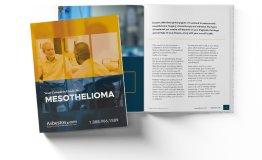Asbestos in Massachusetts
Massachusetts was once home to a thriving shipyard industry, which exposed workers to occupational asbestos through the 1970s. Asbestos use was also prevalent in other local industries, including manufacturing auto parts and textiles. The state ranks 11th in the U.S. for asbestos-related deaths.

Written by Matt Mauney | Scientifically Reviewed By Arti Shukla, Ph.D. | Edited By Walter Pacheco | Last Update: July 16, 2024
Asbestos Exposure in Massachusetts
The Massachusetts shipbuilding industry has a history involving asbestos that has led to illness and death in shipyard workers. Retired shipyard workers are at risk of respiratory disease because materials made with asbestos are prevalent in shipbuilding and many other Massachusetts industries.
State residents were exposed to asbestos in textile mills, power plants and auto parts factories. The state ranks 11th in the nation for mesothelioma and asbestosis deaths.
Occupations at Risk in Massachusetts
The Boston Naval Shipyard operated from 1801 until 1974. It was one of the country’s most vital shipbuilding facilities. From 1941 to 1945, the shipyard employed nearly 50,000 workers to build U.S. Navy ships to serve in World War II.
Job Sites with Asbestos Exposure:
- Boston Naval Shipyard
- Charlestown Navy Yard
- Pilgrim Nuclear Power Plant
- W.R. Grace (Auto Parts Manufacturing)
- Tyco Healthcare Group (Textile Mills)
According to a Navy report, as many as 300 components on each ship contained asbestos. The mineral was a primary ingredient in insulation panels, epoxies and gaskets. The Navy began regulating the use of asbestos in its ships in 1973 and closed the Boston Naval Shipyard a year later.
Later that decade, some of the first studies linking asbestos exposure to lung disease entered the public discourse. Numerous workers exposed to asbestos developed respiratory disorders decades later.
Massachusetts Superfund Site
Massachusetts officials have asked for $1 million in private funding to help restore 22 acres of land and water at the Blackburn & Union Privileges Superfund Site. The land is polluted by asbestos, lead, arsenic and other hazardous substances.
The site in Walpole, Massachusetts, was once used by chemical maker and asbestos manufacturer W.R. Grace. The proposed settlement came after the U.S. Environmental Protection Agency agreed to roughly $13 million in cleanup funds for the site. W.R. Grace agreed to the proposed settlement and will be contributing to the cleanup effort
From 1915 to 1936, a predecessor of W.R. Grace manufactured clutch linings and asbestos brake linings on the site. A predecessor of another party involved in the settlement, Tyco Healthcare Group, ran a textile factory from 1946 to about 1983. The factory used caustic solutions at the site.

Learn about your diagnosis, top doctors and how to pay for treatment.
Get Your Free GuideMassachusetts Clean Air Act
The Massachusetts Clean Air Act resembles the federal law of the same name. Both directives include provisions for the handling, disposal and transporting of asbestos-containing materials.
Companies performing work on buildings or homes that may contain asbestos must follow the laws of the state’s act. Failure to comply can result in fines and civil penalties.
For example, in December 2021, the Massachusetts attorney general issued $245,000 in penalties to two companies. The two businesses were involved in asbestos consulting and abatement. They violated the state’s asbestos laws when improperly removing asbestos-contaminated boiler and pipe insulation.
In September 2018, the Massachusetts attorney general filed suit against Capstone General Contracting, Inc. The company violated the state’s clean air and consumer protection laws. Capstone and its subcontractor were caught illegally removing asbestos pipes from a multi-family home. They paid nearly $200,000 to settle the lawsuit.
In 2014, the Massachusetts attorney general filed suit against Patriot Environmental Corporation. The lawsuit claimed a failure to pay permit fees on at least 24 asbestos projects and a $50,000 penalty for asbestos violations on other projects. The suit also alleged the company failed to take proper safety precautions while removing asbestos shingles from a house in Sturbridge.
This Page Contains 8 Cited Articles
The sources on all content featured in The Mesothelioma Center at Asbestos.com include medical and scientific studies, peer-reviewed studies and other research documents from reputable organizations.
- Hanson, M. (2021, December 10). Malden and Brockton companies to pay $245,000 in penalties, retrain employees over claims of illegal asbestos abatement and monitoring work, AG says. Retrieved from https://www.masslive.com/boston/2021/12/malden-and-brockton-companies-to-pay-245000-in-penalties-retrain-employees-over-claims-of-illegal-asbestos-abatement-and-monitoring-work-ag-says.html
- Attorney General of Massachusetts. (2014, July 15). Environmental company sued for improper asbestos removal in Sturbridge and failing to pay state fees. Retrieved from http://www.mass.gov/ago/news-and-updates/press-releases/2014/2014-07-15-patriots-environmental.html
- Centers for Disease Control and Prevention, National Center for Health Statistics. (2018). Underlying Cause of Death 1999-2017 on CDC WONDER Online Database. Retrieved from http://wonder.cdc.gov/ucd-icd10.html
- Massachusetts Lawyers Weekly. (2013, January 28). Largest verdicts and settlements of 2012. Retrieved from http://masslawyersweekly.com/files/2013/01/LargeVS_012813_web_v2.pdf
- The 189th General Court of the Commonwealth of Massachusetts. (2015). General laws: Limitation of damages for pain and suffering. Retrieved from https://malegislature.gov/Laws/GeneralLaws/PartIII/TitleII/Chapter231/Section60H
- Thomson Reuters. (2314, July 3). Boston federal jury returns $9 million verdict in meso case. Retrieved from http://blog.thomsonreuters.com/index.php/boston-federal-jury-returns-9-million-verdict-in-meso-case/
- U.S. Department of Justice. (2011, August 3). $1 million settlement reached for natural resource damages at Superfund site in Massachusetts. Retrieved from http://www.justice.gov/opa/pr/1-million-settlement-reached-natural-resource-damages-superfund-site-massachusetts
- Croteau, S.J. (2018, September 26). Worchester companies to pay $195k in fines for illegal asbestos work. https://www.masslive.com/news/worcester/index.ssf/2018/09/worcester_companies_to_pay_195.html







